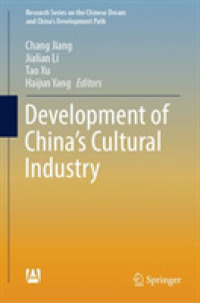- ホーム
- > 洋書
- > 英文書
- > Politics / International Relations
Full Description
Challenging the conventional wisdom that mass mobilization warfare fosters democratic reform and expands economic, social, and political rights, War and Democracy reexamines the effects of war on domestic politics by focusing on how wartime states either negotiate with or coerce organized labor, policies that profoundly affect labor's beliefs and aspirations. Because labor unions frequently play a central role in advancing democracy and narrowing inequalities, their wartime interactions with the state can have significant consequences for postwar politics.
Comparing Britain and Italy during and after World War I, Elizabeth Kier examines the different strategies each government used to mobilize labor for war and finds that total war did little to promote political, civil, or social rights in either country. Italian unions anticipated greater worker management and a "land to the peasants" program as a result of their wartime service; British labor believed its wartime sacrifices would be repaid with "homes for heroes" and the extension of social rights. But Italy's unjust and coercive policies radicalized Italian workers (prompting a fascist backlash) and Britain's just and conciliatory policies paradoxically undermined broader democratization in Britain. In critiquing the mainstream view that total war advances democracy, War and Democracy reveals how politics during war transforms societal actors who become crucial to postwar political settlements and the prospects for democratic reform.
Contents
1. Mobilizing Labor for War and Its Implications for Democracy
2. Disciplining Italian Labor
3. Managing British Labor
4. Choosing a Mobilization Strategy: A Counterfactual Analysis
5. Italian Labor's Revolutionary Socialism
6. British Labor's Moderate Socialism
7. Compliance, Revenge, and the Rise of Italian Fascism
8. Revisiting Competing Accounts, and the Failure of British Reform
Conclusion: Bringing the Politics of War into the Politics of Peace








